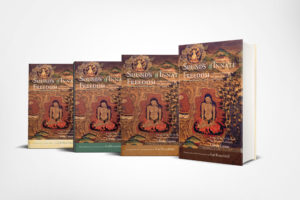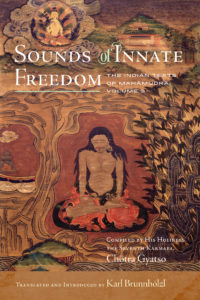
Sounds of Innate Freedom
The Indian Texts of Mahāmudrā
Sounds of Innate Freedom
Sounds of Innate Freedom: The Indian Texts of Mahāmudrā are historic volumes containing many of the first English translations of classic mahamudra literature. The texts and songs in these volumes constitute the large compendium called The Indian Texts of the Mahāmudrā of Definitive Meaning, compiled by the Seventh Karmapa, Chötra Gyatso (1456–1539). The collection offers a brilliant window into the richness of the vast ocean of Indian mahamudra texts cherished in all Tibetan lineages, particularly in the Kagyü tradition, giving us a clear view of the sources of one of the world’s great contemplative traditions.
Explore the Series
Now available!
Sounds of Innate Freedom, Volume 2
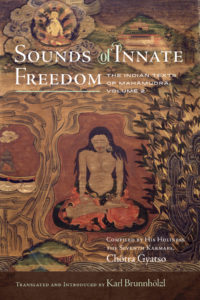 Volume 2 (thirty-four texts) in this historic six-volume series contains two long-established sets of Mahāmudrā works: “The Sixfold Pith Cycle” and short texts of Maitrīpa’s “Twenty-Five Dharmas of Mental Nonengagement,” which present a blend of Madhyamaka, Mahāmudrā, and certain tantric principles, as well as two commentaries by Maitrīpa’s students. The vital focus of this volume is the accomplishment of true reality.
Volume 2 (thirty-four texts) in this historic six-volume series contains two long-established sets of Mahāmudrā works: “The Sixfold Pith Cycle” and short texts of Maitrīpa’s “Twenty-Five Dharmas of Mental Nonengagement,” which present a blend of Madhyamaka, Mahāmudrā, and certain tantric principles, as well as two commentaries by Maitrīpa’s students. The vital focus of this volume is the accomplishment of true reality.
Sounds of Innate Freedom, Volume 3
This third volume contains twenty-four texts, the bulk of which are dohās by Saraha and commentaries on them, as well as works by other renowned Indian Buddhist mahāsiddhas such as Nāropa, Kṛṣṇa, and Śākyaśrībhadra. The extensive commentaries brilliantly unravel enigmas and bring clarity to the songs they comment on as well as to many other songs of realization in the series. These expressive songs of the inexpressible offer readers a feast of profound and powerful pith instructions uttered by numerous male and female mahāsiddhas, yogīs, and ḍākinīs, often in the context of ritual gaṇacakras and initially kept in their secret treasury. Displaying a vast range of themes, styles, and metaphors, they all point to the single true nature of the mind—mahāmudrā—in inspiring ways and from different angles, using a dazzling array of skillful means to penetrate the sole vital point of buddhahood being found nowhere but within our own mind. Reading and singing these songs of mystical wonder, bliss, and ecstatic freedom, and contemplating their meaning, will open doors to spiritual experience for us today just as it has for countless practitioners in the past.
Sounds of Innate Freedom, Volume 4
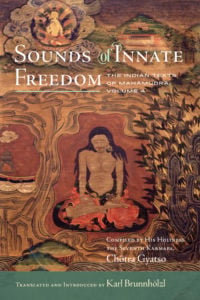 Besides the individual dohās (couplets), vajragītis (vajra songs), and caryāgītis (conduct songs) in this second volume in publication, the three extensive commentaries it contains brilliantly unravel enigmas and bring clarity not only to the specific songs they comment on but to many other, often cryptic, songs of realization in this collection. These expressive songs of the inexpressible offer readers a feast of profound and powerful pith instructions uttered by numerous male and female mahāsiddhas, yogis, and ḍākinīs, often in the context of ritual gaṇacakras and initially kept in their secret treasury. Displaying a vast range of themes, styles, and metaphors, they all point to the single true nature of the mind—mahāmudrā—in inspiring ways and from different angles, using a dazzling array of skillful means to penetrate the sole vital point of buddhahood being found nowhere but within our own mind. Reading and singing these songs of mystical wonder, bliss, and ecstatic freedom, and contemplating their meaning, will open doors to spiritual experience for us today just as it has for countless practitioners in the past.
Besides the individual dohās (couplets), vajragītis (vajra songs), and caryāgītis (conduct songs) in this second volume in publication, the three extensive commentaries it contains brilliantly unravel enigmas and bring clarity not only to the specific songs they comment on but to many other, often cryptic, songs of realization in this collection. These expressive songs of the inexpressible offer readers a feast of profound and powerful pith instructions uttered by numerous male and female mahāsiddhas, yogis, and ḍākinīs, often in the context of ritual gaṇacakras and initially kept in their secret treasury. Displaying a vast range of themes, styles, and metaphors, they all point to the single true nature of the mind—mahāmudrā—in inspiring ways and from different angles, using a dazzling array of skillful means to penetrate the sole vital point of buddhahood being found nowhere but within our own mind. Reading and singing these songs of mystical wonder, bliss, and ecstatic freedom, and contemplating their meaning, will open doors to spiritual experience for us today just as it has for countless practitioners in the past.
Sounds of Innate Freedom, Volume 5
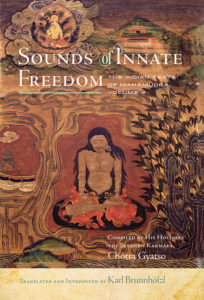 This first volume in publication contains the majority of songs of realization, consisting of dohās (couplets), vajragītis (vajra songs), and caryāgītis (conduct songs), all lucidly expressing the inexpressible. These songs offer readers a feast of profound and powerful pith instructions uttered by numerous male and female mahasiddhas, yogīs, and ḍākinīs, often in the context of ritual gaṇacakras and initially kept in their secret treasury. Displaying a vast range of themes, styles, and metaphors, they all point to the single true nature of the mind—mahāmudrā—in inspiring ways and from different angles, using a dazzling array of skillful means to penetrate the sole vital point of buddhahood being found nowhere but within our own mind. Reading and singing these songs of mystical wonder, bliss, and ecstatic freedom, and contemplating their meaning in meditation, will open doors to spiritual experience for us today just as it has for countless practitioners in the past.
This first volume in publication contains the majority of songs of realization, consisting of dohās (couplets), vajragītis (vajra songs), and caryāgītis (conduct songs), all lucidly expressing the inexpressible. These songs offer readers a feast of profound and powerful pith instructions uttered by numerous male and female mahasiddhas, yogīs, and ḍākinīs, often in the context of ritual gaṇacakras and initially kept in their secret treasury. Displaying a vast range of themes, styles, and metaphors, they all point to the single true nature of the mind—mahāmudrā—in inspiring ways and from different angles, using a dazzling array of skillful means to penetrate the sole vital point of buddhahood being found nowhere but within our own mind. Reading and singing these songs of mystical wonder, bliss, and ecstatic freedom, and contemplating their meaning in meditation, will open doors to spiritual experience for us today just as it has for countless practitioners in the past.
Meet the Translator
 Karl Brunnhölzl, MD, PhD, was originally trained as a physician. He received his systematic training in Tibetan language and Buddhist philosophy and practice at the Marpa Institute for Translators, founded by Khenpo Tsultrim Gyamtso Rinpoche, as well as the Nitartha Institute, founded by Dzogchen Ponlop Rinpoche. Since 1989 he has been a translator and interpreter of Tibetan and English. Karl Brunnhölzl is a senior teacher and translator in the Nalandabodhi community of Dzogchen Ponlop Rinpoche, as well as at Nitartha Institute. Living in Seattle, he is the author and translator of numerous texts. Currently, he is working on the Seventh Karmapa’s compilation of Indian Mahamudra works.
Karl Brunnhölzl, MD, PhD, was originally trained as a physician. He received his systematic training in Tibetan language and Buddhist philosophy and practice at the Marpa Institute for Translators, founded by Khenpo Tsultrim Gyamtso Rinpoche, as well as the Nitartha Institute, founded by Dzogchen Ponlop Rinpoche. Since 1989 he has been a translator and interpreter of Tibetan and English. Karl Brunnhölzl is a senior teacher and translator in the Nalandabodhi community of Dzogchen Ponlop Rinpoche, as well as at Nitartha Institute. Living in Seattle, he is the author and translator of numerous texts. Currently, he is working on the Seventh Karmapa’s compilation of Indian Mahamudra works.

